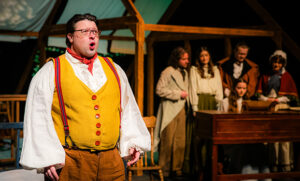
There are nine powerhouse women performing in Neptune Theatre’s production of Calendar Girls, based on the Miramax Motion Picture by Juliette Towhidi and Tim Firth, which opens on March 6, 2020. I had the opportunity to sit down with three of them, Martha Irving (Chris), Francine Deschepper (Celia), and Gil Anderson (Elaine) yesterday at the theatre. The entire cast that director Jeremy Webb has assembled for this show are local. Deschepper was last on the Scotiabank stage in Little Thing, Big Thing in May, Irving has done over forty productions at Neptune, and this show is Anderson’s Neptune debut.
The rehearsal hall for Calendar Girls has been full of tasty treats. Irving tells me about the cake she has made today: chocolate whiskey cake with raspberry buttercream frosting. There is a scene in the play that revolves around a Victoria Sponge cake and Irving explains, “Franny [is] our resident baker. Jeremy said, ‘Franny, make us a Victoria Sponge!’ “So, I did!” says Deschepper. “That started it. Franny made an excellent Victoria Sponge.” “We thought an excellent idea would be for all of us to bring a cake in every day to rehearsal. We’ve had beautiful cakes every day since,” says Deschepper, “Victoria Sponge is like a spongy pound cake, and I guess it was quite popular in the Queen Victoria reign because baking powder had just been invented, and suddenly cakes could rise to these like tower heights where they couldn’t before, so it was very fancy to have a cake that could be fluffy and light and rise up like that. The Victoria Sponge is basically a sponge cake, vanilla flavoured, and it has layers of buttercream or, in my case, I made a mascarpone cream inside with fresh berries.”
Unlike Deschepper, Irving’s character, Chris, in Calendar Girls, is not a baker. “I’m crap at everything,” Irving says of Chris, “I shouldn’t actually be in the Women’s Institute because I can’t actually do anything.” Annie, played by Shelley Thompson, is Chris’ best friend of many years, and her husband, John (Daniel Lillford), has been diagnosed with cancer. She normally bakes the group’s cake entry for the Spring Fête, but because she is busy caring for her husband Chris decides to provide the cake instead. At the same time, in spending time with John at the hospital Annie and Chris realize that the furniture in the relatives’ waiting area is worn and uncomfortable. As members of the Women’s Institute they decide that they are going to raise money through their annual calendar to buy a new settee for the hospital.
“In the past our WI has not really ever raised a lot of money doing our calendars,” says Deschepper, who plays Celia, a recent addition to the group.
“And they’re really boring,” adds Irving, “They’re views of churches and bridges in Yorkshire… as one would expect.”
“So Annie and Chris cook up this idea and present it to the other four of us,” adds Deschepper, “who decide to do this calendar of these sort of beautiful, artful renditions of nudes, but nudes taken in the everyday practice of what the WI does: so there’s knitting, and there’s baking, and there’s flower arranging, and there’s painting, and piano playing- we set up all these scenarios where we are doing these ordinary things, but there’s these beautiful, artful renditions of the mature woman’s body, in all its various shapes and sizes.
“And all of its glory,” adds Irving, “And in doing so it changes the women’s lives.”
“We learn to be more confident, we learn to bond together as women, we all grow a little bit from the experience,” says Deschepper.
“We learn to feel beautiful,” says Irving.
“We learn to accept who we are, and we learn that, especially with cancer being a theme in this play, and aging being a theme in this play, we learn to accept those things that we can’t change in life, and to appreciate what we have. It’s quite empowering,” says Deschepper, “I have to say, we were all quite, various degrees of reluctant or nervous to finally get to that scene in rehearsal, but I think we’ve all kind of found it quite empowering.”
Irving agrees, “Yeah, there’s a real bonding that happens over the whole process because you are being open and vulnerable, but also in the end, you’re celebrating the human form, the mature human form, which is wonderful.”
“There’s a quote in the play that John says”, adds Deschepper, “not to give away too much, but he has a poem that he’s written and one of the lines is about the phases of a woman’s life and he says the last phase is “the most glorious.”
Deschepper’s character, Celia, has a wealthy husband and comes from a higher class town where she had hung out in a golf club before joining the Yorkshire WI. “She seems to be very confident and self assured, but as the story unfolds we find out, actually, the women at the golf club don’t accept her, they think that she is a little trashier, and they talk behind her back, and it’s through the bonding with these women, who she calls the “real women of Yorkshire County,” that she [realizes] for the first time that she can make a choice: ‘I don’t need to hang out and pretend to be someone I’m not, I can be myself.’ I think that’s a really powerful message in the play as well.”
Anderson plays Elaine, who she describes as “a device of another character’s storyline,” saying, “her husband is cheating on her and I’m the other woman, and she confronts me. She may not have found that sense of self before doing the calendar.”
“It’s wonderful that the playwright has made your character a “beautician,” says Irving, “so you’re all about young, female beauty by painting it on, but what we’re finding out is that our beauty is inherent within us.”
“And with the relationships that we have with each other, and our partners, and with ourselves,” adds Deschepper.
“For me, as an actor, it tears me up to think about it, but watching a group a women, the cast, watching in my real life, real women portray this group of real women has been a total mind blowing experience for me. I feel like I’ve gotten paid to take a masterclass, in many ways, watching them in rehearsal, watching from the wings. I feel empowered just being in the room with them. I can’t wait for people to see it. I really can’t wait to talk about it with my girlfriends and just to share it with everybody,” says Anderson.
The play is based on a true story, and in real life Angela Baker and her friends’ efforts have since raised over 5 million pounds for Leukaemia and Lymphoma Research in the United Kingdom.
“There’s a lot of really funny moments [in this play],” says Deschepper, “but at the heart of it, it’s a really beautiful story about life and aging and loss.
“And friendship,” adds Anderson, “and one little action that these women did that has grown- it’s still making money.
“Isn’t that incredible?” adds Deschepper.
“Because they thought: “We can do this.” says Anderson.
“- We’ll be really brave and do this uncomfortable thing,” says Irving, “and look at the pay off.”
Calendar Girls plays at Neptune Theatre’s Fountain Hall (1593 Argyle Street, Halifax) until March 29th, 2020. March 6th is Opening Night, March 10th is Industry Night, March 11 is Talkback Night, and March 25 is a Relaxed Performance. Tickets are $30.00-$84.00 and are available ONLINE HERE, by phone at 902.429.7070 or at the Box Office on Argyle Street.
You can follow Neptune Theatre on Social Media: Facebook. Twitter. Instagram (@NeptuneTheatre). Join the Conversation using #HfxCalendarGirls








